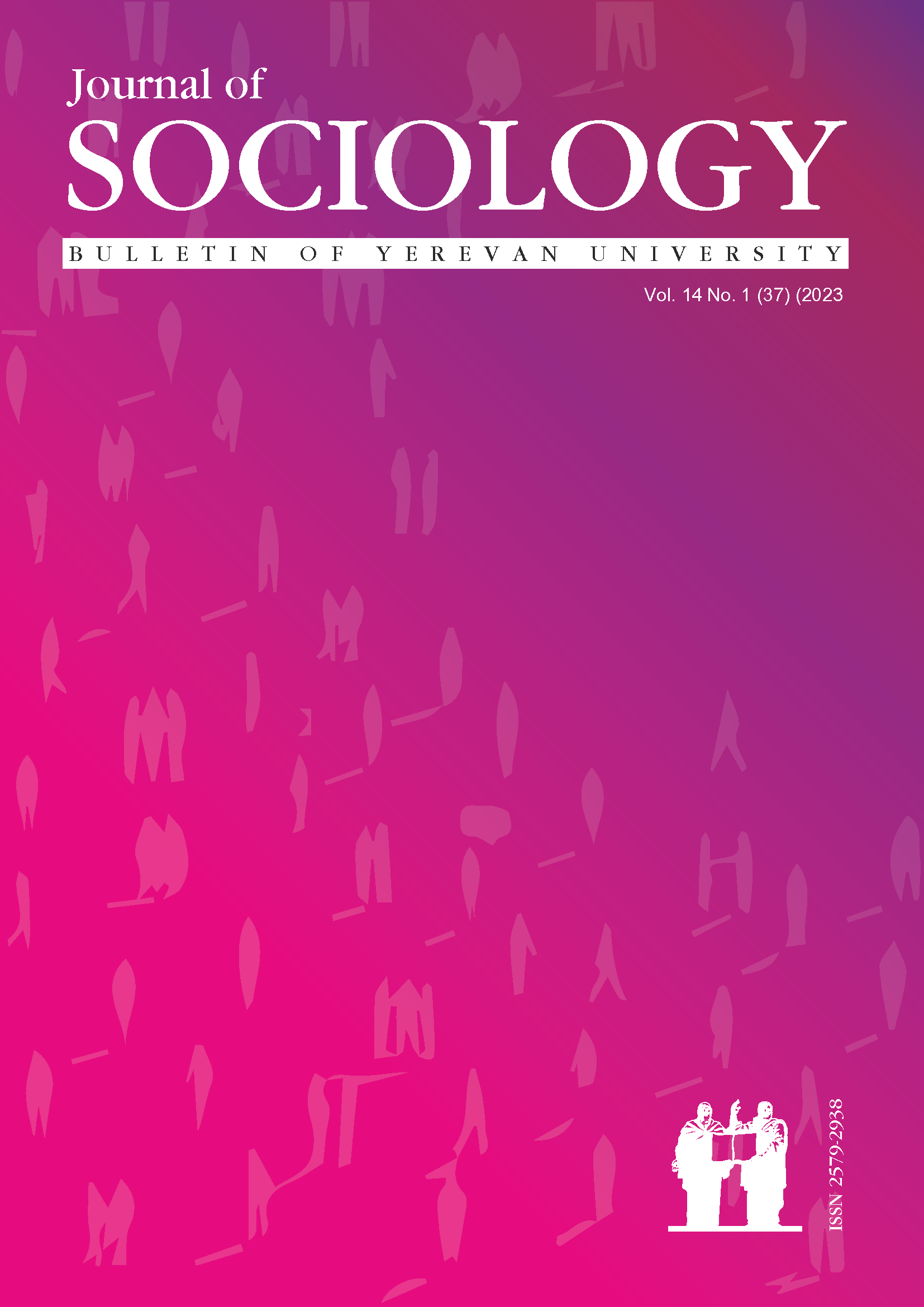Youth Perceptions of the War in Ukraine and its Possible Consequences (On the Case of Armenian Youth in Yerevan)
DOI:
https://doi.org/10.46991/BYSU:F/2023.14.1.007Keywords:
War in Ukraine, Russia, Karabakh War, youth, Armenia, perceptions, interests, regional securityAbstract
To discover the geopolitical orientation and opinions of the Armenia’s youth regarding Russia’s war in Ukraine in the context of regional security issues, a sociological study was conducted in Yerevan and Armenia’s provinces in 2022. It was carried out by specialists from the Faculty of Sociology of the Yerevan State University, in cooperation with the Konrad Adenauer Foundation office in Armenia, and Socies expert center. The study aimed to discover the youth’s perceptions of the reasons for Russia’s war in Ukraine, which started on February 24, 2022, including its possible impact on the region. The research was carried out from October 22, 2022 to November 22, 2022 with youth (18-35 age group) residing in Yerevan (the capital of Armenia) and all provinces of Armenia, using the focus group discussion method. In this paper, we discuss conclusions drawn from focus group discussions with Yerevan residents. The perceptions of the Russian-Ukrainian conflict by Armenia’s youth refers to its geopolitical nature, to the interests of Russia, NATO, EU, USA, Turkey in the post-Soviet space, as well as to personal qualities, approaches, and issues of the leaders of Russia and Ukraine. In general, according to Armenian young people, Armenia should remain as neutral as possible in its position on the war in Ukraine, taking no side in this conflict.
References
Annexation Chronicles: ‘Crimean spring’ in the Memories of Participants in the Events. (2019, March 19). BBC News. Retrieved November 23 from https://www.bbc.com/russian/features-47609756
Åslund, A. (2009). How Ukraine Became a Market Economy and Democracy. Washington: Peterson Institute for International Economics
Bowen, A. S. (2022). “Russia’s War in Ukraine: Military and Intelligence Aspects”. Congressional Research Service, R47068. Retrieved November 23, 2022 from https://crsreports.congress.gov
Brzezinski, Z. K. (2006). The Grand Chessboard: American Primacy and Its Geostrategic Imperatives. [Repr.] ed. New York NY: Basic Books.
Cheterian, V. (2008). ”Georgia’s Rose Revolution: Change or Repetition? Tension between State-Building and Modernization Projects”. Nationalities Papers, 36(4), pp. 689–712. doi:10.1080/00905990802230530
Fairbanks, Ch. H. (2004). ”Georgia’s Rose Revolution.” Journal of Democracy, 15(2), 110–124. doi:10.1353/jod.2004.0025
Global Impact of War in Ukraine on Food, Energy and Finance Systems” (2022). UNSDG BRIEF. No 1, 13 APRIL. Retrieved November 23, 2022 from https://unsdg.un.org/resources/global-impact-war-ukraine-food-energy-and-finance-systems-brief-no1
Gwendolyn, S. (2017, March 15). “Revisiting the 2014 Annexation of Crimea”. Carnegie Europe. Retrieved November 24, 2022 from https://carnegieeurope.eu/2017/03/15/revisiting-2014-annexation-of-crimea-pub-68423
History of Crimea’s reunification with Russia. (2019, March 15). TASS. Retrieved November 26, 2022 from https://tass.ru/info/6222164
Kotoulas, I. E., Pusztai W. (2022). “Geopolitics of the War in Ukraine”. Report No. 4, June. Foreign Affairs Institute, Athens, Greece
Kramer, M. (2016). “Why Did Russia Give Away Crimea Sixty Years Ago?” Wilson Center. Retrieved November 21, 2022 from: https://www.wilsoncenter.org/publication/why-did-russia-give-away-crimea-sixty-years-ago
Lane, D. (2008). The Orange Revolution: ‘People’s Revolution’ or Revolutionary Coup? The British Journal of Politics and International Relations, 10(4), pp. 525–549. doi:10.1111/j.1467-856x.2008.00343.x
Lebow, R. N. (2022). International Relations Theory and the Ukrainian War. Analyse & Kritik, 44(1): 111–135. DOI: Retrieved November 23, 2022 from https://doi.org/10.1515/auk-2022-2021
Malishev, D. (2019). Commonwealth of Independent States: Spatial Organizational Dynamics. Analysis and Forecast. Journal of the Institute of World Economy and International Relations, Russian Academy of Sciences no. 3, pp. 23-36. DOI: 10.20542/afij-2019-3-23-36
Marten, K. (2015). Putin’s Choices: Explaining Russian Foreign Policy and Intervention in Ukraine. The Washington Quarterly, 38(2), 189-204, DOI: 10.1080/0163660X.2015.1064717
Mearsheimer, J. (2022, August 17). Playing With Fire in Ukraine. The Underappreciated Risks of Catastrophic Escalation. Foreign Affairs. Retrieved November 23, 2022 from https://www.foreignaffairs.com/ukraine/playing-fire-ukraine
Mearsheimer, J. (2014, September-October). Why the Ukraine Crisis Is the West’s Fault: The Liberal Delusions That Provoked Putin. Foreign Affairs. 1–12
Nye, J. S. (1990). Bound to Lead: The Changing Nature of American Power. New York: Basic Books
Putin tears up lease for Sevastopol naval base. (2014, April 2). Financial Times. Retrieved November 28, 2022 from https://www.ft.com/content/5a610a56-ba85-11e3-8b15-00144feabdc0
Pishchikova, K., Ogryzko, O. (2014). Civic awakening: The Impact of Euromaidan on Ukraine’s Politics and Society. FRIDE Working Papers, No. 124. Retrieved November 26, 2022 from https://www.files.ethz.ch/isn/182317/Civic%20awakening_%20The%20impact%20of%20Euromaidan%20on%20Ukraine%E2%80%99s%20politics%20and%20societ.pdf
Pikulicka-Wilczewska, A., Sakwa, R. (Eds., 2016). Ukraine and Russia People, Politics, Propaganda and Perspectives. E-International Relations Publishing, Bristol, England.
Peng, C. (2017). “Why the Ukraine Crisis Is the West’s Fault: A Historical and Philosophical Perspective”. International Critical Thought, 7(2), 267-278, DOI: 10.1080/21598282.2017.1316436
Pisano, J. (2022, July). How Zelensky Has Changed Ukraine. Journal of Democracy, 33(3), pp. 5-13
Serafin, T. (2022). Ukraine’s President Zelensky Takes the Russia/Ukraine War Viral. Orbis, 66(4), P. 460-476. DOI: Retrieved November 23, 2022 from https://doi.org/10.1016/j.orbis.2022.08.002
Sologoub, I. (2022). Ukraine’s EU Integration: A Long Way Home. Intereconomics, 57(4), pp. 218–224. Retrieved November 23, 2022 from https://www.intereconomics.eu/contents/year/2022/number/4/article/ukraine-s-eu-integration-a-long-way-home.html
Terzyan, A. (2019). The Aftermath of the ‘Velvet Revolution’: Armenia between Domestic Change and Foreign Policy Continuity. Eastern European Journal for Regional Studies (EEJRS), l (2), pp. 24-43
The Importance of Ukraine and The Russian Federation for Global Agricultural Markets and The Risks Associated With The War in Ukraine”. (2022, June 10). Food and Agriculture Organization of the United Nations. Retrieved November 23, 2022 from https://www.fao.org/3/cb9236en/cb9236en.pdf
Ukraine focus at Vilnius Summit (2013, November 28). DW. Retrieved November 28, 2022 from https://www.dw.com/en/vilnius-summit-overshadowed-by-ukrainian-trade-deal-rejection/a-17260699
Ukraine Will Not Join CSTO. Atlantic Council. (2010, May 28). Retrieved November 21, 2022 from https://www.atlanticcouncil.org/blogs/natosource/ukraine-will-not-join-csto/
Ukraine extends lease for Russia’s Black Sea Fleet. (2010, April 21). The Guardian. Retrieved November 30, 2022 from https://www.theguardian.com/world/2010/apr/21/ukraine-black-sea-fleet-russia
Downloads
Published
How to Cite
Issue
Section
License
Copyright (c) 2023 Arthur Atanesyan, Artur Mkrtichyan

This work is licensed under a Creative Commons Attribution-NonCommercial 4.0 International License.








